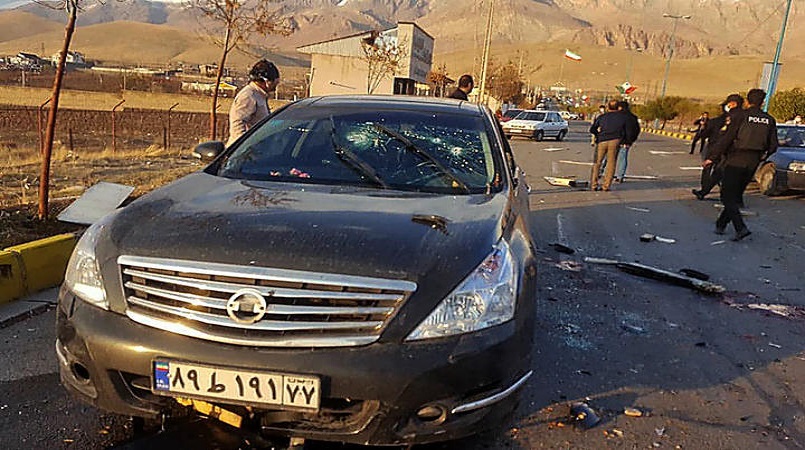
Iran's most senior nuclear scientist Mohsen Fakhrizadeh has been assassinated near the capital Tehran, the country's defence ministry has confirmed.
Fakhrizadeh died in hospital after an attack in Absard, in Damavand county.
Iran's Foreign Minister Mohammad Javad Zarif, has condemned the killing "as an act of state terror".
Western intelligence agencies view Fakhrizadeh as being behind Iran's covert nuclear weapons programme.
"If Iran ever chose to weaponise (enrichment), Fakhrizadeh would be known as the father of the Iranian bomb," one Western diplomat told Reuters news agency in 2014.
News of the killing comes amid fresh concern about the increased amount of enriched uranium that Iran is producing. Enriched uranium is a vital component for both civil nuclear power generation and military nuclear weapons.
Iran insists its nuclear programme is exclusively for peaceful purposes.
Between 2010 and 2012, four Iranian nuclear scientists were assassinated and Iran has accused Israel of complicity in the killings.
Fakhrizadeh's name was specifically mentioned in Israeli PM Benjamin Netanyahu's presentation about Iran's nuclear programme in May 2018.
The killing has led to speculation that it could provoke confrontation between Iran and its foes in the last weeks of Donald Trump's presidency.
The death of Mohsen Fakhrizadeh will also complicate any effort by US President-elect Joe Biden to revive the detente of Barack Obama's presidency.
Iran pointed the finger at Israel, while implying the killing had the blessing of the departing Trump. Zarif wrote on Twitter of "serious indications of (an) Israeli role".
The military adviser to Supreme Leader Ayatollah Ali Khamenei vowed to "strike as thunder at the killers of this oppressed martyr".
"In the last days of the political life of their ... ally (Trump), the Zionists seek to intensify pressure on Iran and create a full-blown war," Hossein Dehghan tweeted.
There was silence from foreign capitals. Israel declined to comment. In the United States, the White House, Pentagon, State Department and CIA all declined to comment, as did Biden's transition team.
Robert Malley, who served as Iran adviser to Obama and has informally advised Biden's team, said Fakhrizadeh's killing was among a series of moves that have occurred during Trump's final weeks that appear aimed at making it harder for Biden to re-engage with Iran.
"One purpose is simply to inflict as much damage to Iran economically and to its nuclear programme while they can, and the other could be to complicate President Biden's ability to resume diplomacy and resume the nuclear deal," said Malley, adding that he would not speculate on who was behind the killing.
A US official confirmed earlier this month that Trump had asked military aides for a plan for a possible strike on Iran. Trump decided against it at the time because of the risk of a wider Middle East conflict.
Last January, Trump ordered a US drone strike in Baghdad that killed Qassem Soleimani, Iran's most powerful military commander. Iran retaliated by firing missiles at a US base in Iraq, the closest the two foes have come to war in decades.
